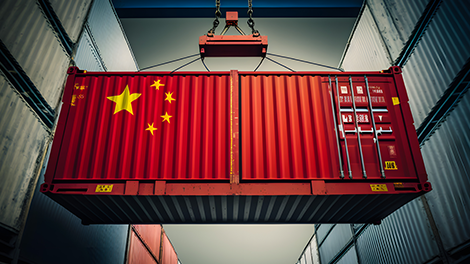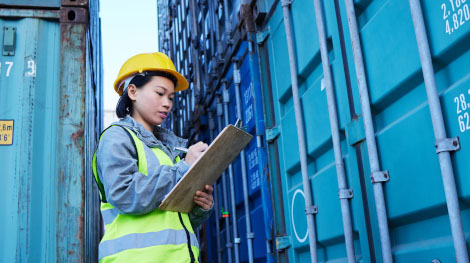Organisations wishing to trade between China and the UK need to abide by a series of requirements that are crucial to ensuring smooth business practices.
The UK does not have a specific trade deal with China. Consequently, trade is done on non-preferential WTO (World Trade Organisation) terms. Whether you need to pay import tax on your goods and the incoterms being used in the trade and what kind of product you are importing.
The initial steps you need to complete in preparation for importing from China:
- Check your goods aren’t banned from being imported from China to the UK, or require an import licence. The sort of goods that require an import licence includes, but isn't limited to; animals and animal products, human medicine and hazardous chemicals.
- Ensure the company who are sending the goods from China are able to export them.
- Establish whether the selling or buying party is responsible for paying import duty, based on the incoterms in use.
- Ensure you have an EORI (Economic Operator Registration Identification) number. Apply for one here: https://www.gov.uk/eori. This number is used for record-keeping and all businesses in the UK are required to have one when importing goods from China.
- Find the correct commodity code for your products, which will reveal whether import tax is due. Guidance on this is below.
Now, if you are shipping products on DDP (Delivered Duty Paid) incoterms, then the selling party will take care of the import customs clearance, therefore you will not need to pay any duty on the goods.
However, the overwhelming majority of goods trade between China and the UK is done on FOB (Free on Board) incoterms, which means the buying party are responsible for organising the sea freight transportation, onward transportation to the delivery location and, the import customs clearance.
Finding the right commodity code
If you are responsible for the import clearance, you need to find the correct commodity code (10-digit number) for the products you are importing to complete the correct import declarations and other paperwork.
You can locate these by using the UK Government Trade Tariff, where you can look up the commodity code, duty and VAT rates for anything. You will also be notified if you can apply for a preferential duty rating. Be sure to switch to the Northern Ireland Online Tariff if you're in NI, as your rates are different to the remainder of the Great Britain.
On the trade tariff page, type the name of your product in the search box and it will look for its commodity code. After that you should be able to click through the categories find your product's exact code.
If you scroll down it should also give you the import tax rate for your product from every country. So, you just need to see what the rate is for import from China. Check out the example below where I look up the commodity code and import duty rate for a chocolate bar coming from China.

As you can see above, China is not one of the countries or trading bloc's that the UK has a deal with on this particular product. It just falls under "all countries", therefore a tax rate of 8% is due.
As a side note, it can sometimes be very difficult to find your commodity code if you are importing a complex product into the UK. If you apply the wrong code, you could end up paying more duty than you need to or your goods could be held up by customs. But don't worry if you're not sure, there are solutions.
Top tip: Keep a written record explaining why you came to a particular decision on a commodity code. If customs officials can see evidence and logic for using that commodity code, rather than trying to be deceptive to avoid duty, they are likely to view the case more favourably.
Solutions if you are not sure of the right commodity code
- If you aren't clear on your commodity code, you can email classification.enquiries@hmrc.gsi.gov.uk. You will need to provide a full description of the goods and, they can assist with obtaining the correct one.
- If you would like the peace of mind the code you have chosen is 100% accurate, you can get a Binding Tariff Information (BTI) ruling. You can apply for one of those here.
WTA UK is more than happy to assist in ensuring that you have the correct commodity code. Contact us.
Paying custom duties and VAT
You must pay the required rate of duty and VAT, as stated with the commodity code. If payment isn’t made, your goods could end up getting held up in customs causing delays and unexpected costs.
The duty is paid on the cost of the goods and the shipping costs. There are 6 ways to establish the value of your goods, which you can read about here. Duty rates tend to range from 0-12%.
Once you have applied the duty rate, you then need to add VAT on top of that at 20%. But remember, if you are VAT registered you should be able to claim back any VAT paid on the goods you have imported.
Completing a customs declaration is quite a complicated process. If you want to do the declaration yourself, you’ll need to apply for access to Customs Declaration Service (CDS) and have the necessary software to submit the declarations through it. We recommend that you undertake customs training to ensure that you are compliant.
Alternatively, you can consult with an expert customs broker, such as WTA.
WTA's systems allow us to input customs information electronically, calculating payable duties and taxes, and checking for errors automatically.
Any information submitted to customs yourself or through a customs broker needs to be thorough and correct. Ensure you have included full details on all the labels and invoices that state the address of the sender and receiver, the quantity of the goods, their value, the commodity codes and a complete description of the contents.

Is China still the world's import hub?
This latest in-depth research report evaluates China's status as the world's import hub; examining the economic and political changes which could inspire businesses to look elsewhere.
Working with WTA UK means we can easily assist in managing this imports process for you. We will also work with you to make use of bonded warehouses where possible. These allow you to delay duty payments until such a time as the goods are sold, dramatically improving cashflow.
When looking to import from China, it is essential to engage seasoned professionals like WTA. We do the hard yards for you, ensuring that your goods make a seamless journey and are compliant with all trade requirements.
Before importing your goods from China, we work with you to take the necessary steps listed above to ensure a smooth sailing operation.
Speak to Jamie Craig, our Customs Specialist, for more specialist guidance today.








